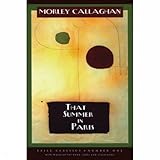Two authors walk into a room. One – brooding, macho, fixated on war, fighting, hunting, and conflict in general. The second – driven to drink, floating above the revelers, with a crazy wife to deal with. If the mythmakers have done their job over the decades, you know exactly who I’m talking about. Even if the facts deviate from, or even contradict, the myth.
Ernest Hemingway and F. Scott Fitzgerald – two pillars of early twentieth century fiction. Two fixtures of 1920s Paris. Two writers whose actual lives weren’t quite what the mythological line would have us believe.
 Morley Callaghan’s That Summer In Paris, written in 1962, reveals Hemingway’s and Fitzgerald’s true nature, and offers an insider’s view of the events in Paris, in the summer of 1929.
Morley Callaghan’s That Summer In Paris, written in 1962, reveals Hemingway’s and Fitzgerald’s true nature, and offers an insider’s view of the events in Paris, in the summer of 1929.
Callaghan in the mid 1920s was still years away from being the Canadian literary lion that he would become. A college student in Toronto, Callaghan had written a handful of short stories and was employed as a reporter for the Toronto Star. Returning to the newsroom after several years writing European dispatches for the Star was another writer of fiction, a few years Callaghan’s senior. That correspondent was Ernest Hemingway, and for the next few months in Toronto, Callaghan and Hemingway struck up a friendship. Recognizing a kinship, they became sounding boards for each other’s fiction.
Fast forward to 1929. Hemingway had by then left the Star, had decamped and returned to Paris to focus on his fiction. Already established, with In Our Time and The Sun Also Rises behind him, and A Farewell to Arms well underway, Hemingway was already a legendary figure in Paris, at times helping to cultivate his own public persona.
He’d stayed in touch with the young Canadian and helped him get some attention from publishers when, in 1929, 26-year-old Callaghan and his wife moved to Paris. It was a heady time, but one which seemed to be entering some kind of transition. Scott Fitzgerald – wealthy and established – was there, but his legendary friendship with Hemingway was fragile, and when Callaghan arrived, they weren’t speaking. Ford Madox Ford was in town. So was James Joyce. These were the closing months of what Hemingway would dub the “moveable feast.”
Callaghan, becoming a hot young writer, became part of the scene, and his encounters with these legends make for a fascinating memoir. More fascinating still are the close friendships that he developed – separately – with Fitzgerald and Hemingway. In private moments, as they read each others’ manuscripts, we see glimpses of their lives away from the glare. We realize that the myths that surround them – then and now – are only a small part of a bigger picture. Not that they didn’t propagate their own myths, but their quieter selves shine through – sometimes sweet and shy, sometimes arrogant – but often surprisingly insecure.
Fitzgerald, in particular, comes off as a gentle – and gentlemanly – sort. Eager for Hemingway’s friendship which had gone off the rails, Fitzgerald always remained Hemingway’s biggest fan, and took it personally when others slighted his old friend Ernest.
Hemingway was a bit harder to get a read on. He could be thoughtful and sweet, and he was a good companion – and sparring partner in the boxing ring – to Callaghan during his early weeks in Paris. But as his strained relationship with his old friend Scott demonstrates, he could also be remote, withdrawn.
Morley Callaghan’s memoir covers much the same ground as Hemingway’s own masterpiece of memoir A Moveable Feast – a set of perfect vignettes, each reading like a short story.
Callaghan’s memoir is more conventional in style, but its insider’s view makes is essential for anyone interested in Hemingway, Fitzgerald, and the closing moments of 1920s Paris.








